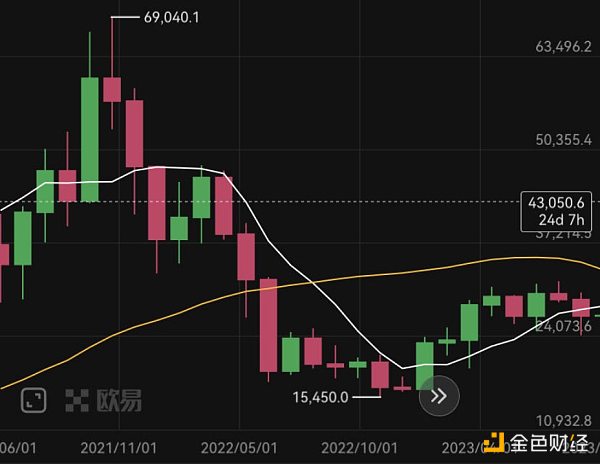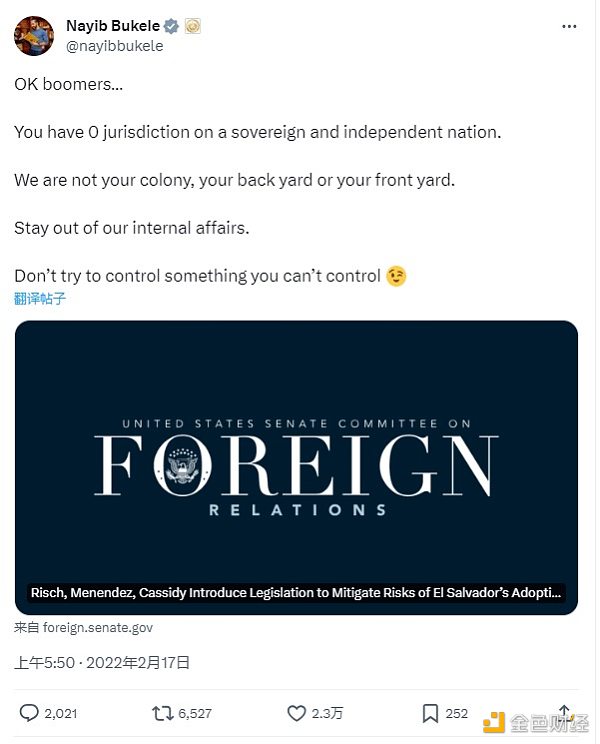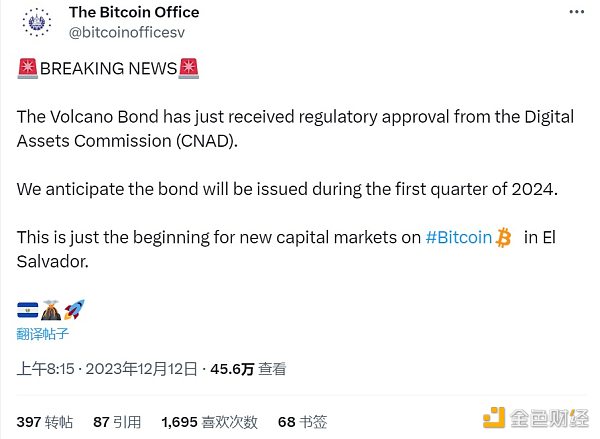Source: Carl, Techub News
On February 4, Salvadoran President Nayib Bukele, who made Bitcoin the national legal tender during his term, was successfully re-elected with 87% of the vote.
More than 2 years ago, El Salvador became the focus for becoming the first country to adopt Bitcoin as its legal currency. President Nayib Bukele, who supports Bitcoin, has also become an "international" KOL. Nayib Bukele currently has 7.6 million followers on Tiktok, which is more than the entire population of El Salvador (6.3 million).

More than two years after Bitcoin was recognized as legal tender, El Salvador’s Bitcoin policy has faced many controversies. The International Monetary Fund has opposed it, and the currency speculation has caused losses of nearly 70 million U.S. dollars. Not high-class. However, the successful re-election of Nayib Bukele seems to prove to the outside world that El Salvador’s Bitcoin experiment did not fail as reported by the mainstream media.
The whole country speculated on the currency, from floating losses to floating profits.
In June 2021, the El Salvador Congress passed a bill approving Bitcoin as the country’s legal tender. Three months later, on September 7, the bill officially came into effect, and El Salvador Becoming the first country in the world to adopt Bitcoin as legal tender.
On September 7, Nayib Bukele announced that the country’s government would purchase the first batch of 200 Bitcoins, and a total of approximately 700 were purchased in the following two weeks. Regarding Bitcoin, El Salvador’s behavior was ridiculed by the media as “the president takes the lead and the whole country speculates on the currency.”
The cryptocurrency industry was in the midst of its last bull market at the time, with Bitcoin prices at around $50,000 in September 2021 and reaching the peak of the bull market at $69,000 in November. Subsequently, the price of Bitcoin plummeted, reaching as low as $15,450 in November 2022.

During the decline, Nayib Bukele repeatedly announced buying on dips. By mid-2022, El Salvador had spent approximately US$100 million on purchasing Bitcoin, with an average price of nearly US$46,000.< /p>
Calculated at this price, at the lowest point of Bitcoin price, the value of the Bitcoin purchased by El Salvador shrank by about 2/3, resulting in a floating loss of US$66 million.
Faced with social doubts , Nayib Bukele responded: "Stop looking at the charts and enjoy life. Its value will increase significantly after the bear market. Patience is the key."

The recent market seems to prove that Nayib Bukele is right. Although the bull market has not really arrived, El Salvador’s Bitcoin is not far from profitability. When the United States approved a Bitcoin spot ETF, El Salvador was Bitcoin investment gained $12.6 million.
Although the price of Bitcoin fluctuated greatly, it did not make El Salvador give up. El Salvador Vice President Felix Ulloa recently said that during Nayib Bukele’s second term, Bitcoin will remain El Salvador’s legal tender.
IMF: Significant risks
As a Central American country known for poverty and violence, El Salvador has Bitcoin’s advanced practice is not favored by the outside world.
The International Monetary Fund (IMF) stated in a statement in November 2021 that Bitcoin should not be used as legal tender in El Salvador. There are "significant risks" to consumer protection, financial integrity and financial stability, and El Salvador must immediately implement stronger regulation and supervision to protect the safety of U.S. dollar and Bitcoin funds by isolating reserve assets.
El Salvador rejected the International Monetary Fund’s recommendations. Its finance minister said that no international organization can force El Salvador to do anything and that Bitcoin is a “sovereignty” issue.
In response to El Salvador’s policies, several U.S. senators jointly proposed an El Salvador Cryptocurrency Accountability Act, requiring the State Department to report on El Salvador’s legislation to adopt Bitcoin as legal tender and plans to mitigate potential risks to the U.S. financial system. . El Salvador has used the U.S. dollar as legal tender for nearly 20 years.
In response, Nayib Bukele said that the United States has 0 jurisdiction over sovereign and independent countries and should stay away from its internal affairs.

In early 2022, rating agency Fitch downgraded El Salvador's long-term foreign currency issuer default rating (IDR) to "CCC" from "B-". Fitch said El Salvador faces a $1.2 billion financing gap in 2022, rising to $2.5 billion in 2023, and faces nearly $1.2 billion in foreign debt amortization.
In January 2023, Nayib Bukele said: “Over the past year, almost all traditional international news media have said that El Salvador will default on its debt by January 2023 due to betting on Bitcoin. But now , the US$800 million bond has been repaid in full."
However, the International Monetary Fund delegation responded after its visit to El Salvador that there was no risk in El Salvador because the use of Bitcoin is still limited. While Bitcoin usage in El Salvador may increase due to factors such as Bitcoin’s legal tender status, government encouragement of the use of crypto-assets, and a push for tokenized bonds, potential risks remain.
According to a recent survey by Chayanika Deka, 12% of the local population in El Salvador used Bitcoin at least once to pay for goods and services in 2023, compared with 24.4% in 2022.
In September 2023, the International Monetary Fund’s negotiating team stated after visiting El Salvador that it was “very productive” and that although it did not support Bitcoin as legal tender, it was working with El Salvador to resolve “technical issues.” ” and minimize the risks associated with the country’s adoption of Bitcoin as legal tender.
Tether, Binance, etc. have entered the market
However, judging from the practical results of more than 2 years, Bitcoin has not made El Salvador worse. , El Salvador has also made some good progress in the cryptocurrency field.
In order to promote the implementation of Bitcoin’s legal tender status, El Salvador established the National Bitcoin Office at the end of 2022, aiming to manage all projects related to cryptocurrency. In early 2023, the Salvadoran Congress approved a bill on the issuance of digital assets, establishing a legal framework for all digital assets, allowing the public issuance and transfer of digital assets, and laying a legal foundation for the issuance of its Bitcoin bonds.
In December 2023, the National Bitcoin Office announced that the Bitcoin bond "Volcano Bond" has been approved and is expected to be issued on the RWA securitization platform Bitfinex in the first quarter of 2024. Last April, Bitfinex received a digital asset license from El Salvador.

Binance, a trading currency exchange, has also entered El Salvador. In August last year, the Central Reserve Bank of El Salvador granted Binance a Bitcoin service provider license, and the National Crypto-Assets Commission granted Binance a crypto-asset service provider license. License.
In June 2023, stablecoin giant Tether issued a document stating that it had participated in El Salvador’s multi-billion dollar renewable energy plan and planned to invest US$1 billion to build a renewable energy power generation park “Volcano Energy” , using solar and wind energy from volcanic areas, aims to build one of the largest Bitcoin mining farms in the world.
In May 2023, Jack Mallers, CEO of Lightning Network payment application Strike, said that Strike had moved its global headquarters to El Salvador in response to growing anti-cryptocurrency regulation in the United States.
Recently, El Salvador also approved an immigration law granting citizenship to foreigners who donate Bitcoin to the Salvadoran government and economic development projects.
Previously, the El Salvadoran government and Tether launched a free visa program. Foreigners can obtain a residence visa and citizenship by investing US$1 million in cryptocurrency in El Salvador. According to Reuters, some foreign promoters of digital currencies have immigrated to El Salvador and mainly gather in beach communities.
 Edmund
Edmund










